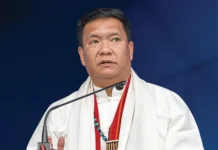Staff Reporter
NAHARLAGUN, 20 Jul: The Itanagar permanent bench of the Gauhati High Court here has stayed the state government’s order allowing issuance of temporary permits for developmental works in public and private sectors only to people vaccinated against Covid-19.
A single-judge bench comprising Justice Nani Tagia on 19 July held that the state government order, issued on 30 June, “makes a classification of persons who are Covid-19 vaccinated and unvaccinated for the purpose of issuance of temporary permits, which in turn violates Articles 14, 19 (1) (d) and 21 of the constitution of India.”
The court was hearing a public interest litigation, wherein petitioner Madan Milli had challenged Clause 11 of the state government’s 30 June order which stated: “Tourist ILPs shall remain suspended during the period of this order. However, for developmental works in both public and private sectors, temporary permits may be issued, provided such persons are vaccinated for Covid-19.”
As per the order, persons who are vaccinated against Covid-19 are allowed to be issued a permit to visit Arunachal, while persons who are not inoculated are not allowed to be issued any temporary permit to visit Arunachal for developmental works in both public and private sectors.
The petitioner also cited the RTI information furnished by the health & family welfare ministry, which states that “there is no provision of compensation for recipients of Covid-19 vaccination against any kind of side effects or medical complications that may arise due to inoculation. The Covid-19 vaccination is also entirely voluntary for the beneficiaries.”
Representing the state, Additional Advocate General RH Nabam had submitted that “the restrictions were placed due to the rising cases of Covid-19 in the state, with the sole objective of containing the Covid-19 pandemic and its further spread in the state.”
Examining the prayer for an interim order to suspend Clause 11 of the state governments’ order, the court noted that “there is no evidence available either in the record or in the public domain that Covid-19 vaccinated persons cannot be infected with Covid-19 virus, or he/she cannot be a carrier of Covid-19 virus and consequently a spreader of Covid-19 virus. Insofar as the spread of Covid-19 virus to others is concerned, the Covid-19 vaccinated and unvaccinated person or persons are the same. Both can equally be a potential spreader if they are infected with Covid-19 virus in them.”
“It has been brought to our notice that even persons who have been vaccinated can still be infected with the Covid virus, which would in turn imply that vaccinated persons who are Covid positive can also spread the said virus to others. It is not the case of the state respondents that vaccinated persons cannot be infected with the Covid virus or are incapable of spreading the virus.
“Thus, even a vaccinated infected Covid person can be a superspreader. If vaccinated and unvaccinated persons can be infected by the Covid virus and if they can both be spreaders of the virus, the restriction placed only upon the unvaccinated persons, debarring them from earning their livelihood or leaving their houses to obtain essential items, is unjustified, grossly unreasonable and arbitrary. As such, the submission made by the learned additional advocate general that the restrictions made against unvaccinated persons vis-à-vis vaccinated persons is reasonable does not hold any water. As the vaccinated and unvaccinated persons would have to follow the Covid proper behaviour protocols as per the SOP, there is no justification for discrimination,” the court said.
“If the sole object of issuing the 30 June order by the chief secretary is for containment of the Covid-19 pandemic and its further spread in the state of Arunachal Pradesh, classification ought to be made between vaccinated and unvaccinated persons for Covid-19 virus for the purpose of issuing temporary permits for developmental works in both public and private sectors, vide Clause 11 thereof, prima facie, appears to be a classification not founded on intelligible differentia, nor it is found to have a rational relation/nexus to the object sought to be achieved by such classification, namely, containment and further spread of Covid-19 pandemic,” the court observed.
Granting interim relief by staying the operation of the impugned clause, the court has issued a notice in the matter, returnable on 28 July.



